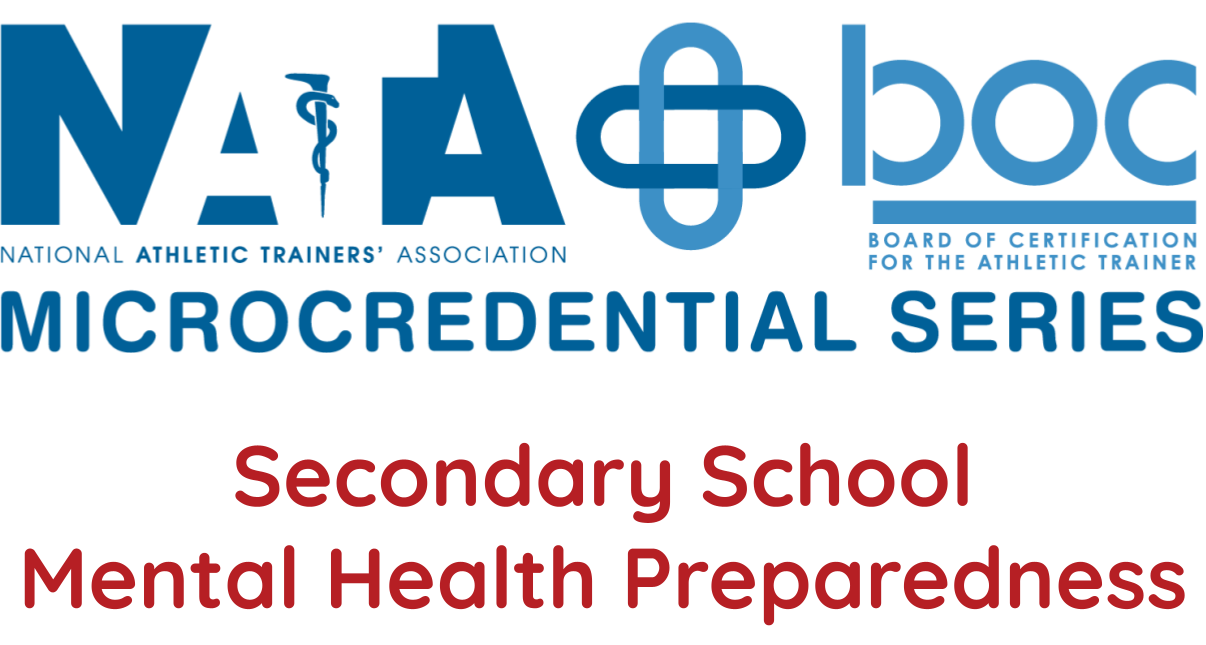
Module 4 - Breaking Barriers: Reducing Mental Health Stigma in School Athletics
| Mental Health Stigma Prevention for Secondary School Athletic Trainers |
Abstract:
One in five teens and US children and adolescents live with a mental illness. 50% of all mental illnesses begin by age 14, and 75% begin by the mid-20s. Mental health challenges in this age group include depression, anxiety, eating disorders, ADHD, and substance use disorders. Stigma associated with mental illness serves as a powerful deterrent to someone seeking help. One way to work to decrease the stigma associated with mental health problems is to educate the public about both the illnesses themselves, as well as how they can help.
Learning Objectives:
- Summarize prevalence of mental illness in US youth.
- Describe strategies to decrease mental health-related stigma at the individual and institutional level.
- Summarize signs and symptoms of the most common mental health disorders in youth.
- Identify appropriate professional referral options for individuals with suspected mental illness.
| The Mental Health Crisis in Sports: The Perfect Storm of Contemporary Factors |
Abstract:
Adolescent and young adult athletes are particularly vulnerable to mental health (MH) conditions, such as depression and anxiety, due to sport-specific stressors like injury, performance pressures, and transitions. This article explores the critical role of athletic trainers in identifying, managing, and preventing these conditions through education, early recognition, and referral systems. It emphasizes the importance of mental health emergency action plans (MHEAPs) and fostering a supportive environment to reduce stigma and encourage help-seeking behavior. Despite growing awareness, many athletic trainers lack sufficient training to effectively address MH concerns, highlighting the need for a structured approach to MH education and care in sports settings.
Learning Objectives:
- Recognize the impact of mental health challenges on academic performance, athletic participation, and overall well-being.
- Define mental health literacy and its components, including recognition, management, and prevention of mental health disorders.
- Employ age-appropriate and empathetic communication when discussing mental health concerns with student-athletes.
Course Level:
Essential
Course Domain(s):
Domain 1: Risk Reduction Wellness and Health Literacy
Domain 4: Therapeutic Intervention
Domain 5: Health Care Administration and Professional Responsibility
Keywords:
mental health, youth, teens, stigma, depression, anxiety, eating disorder, substance abuse, support, awareness
Course Expiration:
This premium course offering must be completed within 12 months from the purchase date.
For full details, refer to the expiration policy on our FAQ page.
Jennifer Ostrowski, PhD, LAT, ATC
Dr. Jennifer Ostrowski is a Full Professor and Director of the Doctor of Athletic Training Program at Moravian University in Bethlehem, PA. She holds an undergraduate degree in Athletic Training from Salisbury University, a Master’s degree from the University of Kentucky, and a Doctoral degree with emphasis in Sport Psychology from Michigan State University.
Dr. Ostrowski’s research centers on mental health and psychosocial aspects of injury, and therapeutic modalities. She has authored a national textbook, titled Psychosocial Strategies for Athletic Training, and over 30 peer-reviewed publications, as well as presenting more than 60 platform and webinar presentations and 40 poster presentations at professional conferences. Dr. Ostrowski’s research on therapeutic modalities has focused on superficial and deep heating modalities, including shortwave diathermy, therapeutic ultrasound, and ThermoStim probe. She has also examined muscle cooling using salted and wetted ice bags, and comparing ice to cryo-compression modalities.
Dr. Ostrowski has been awarded several National, state, and private grants totaling nearly $100,000 to fund her therapeutic modalities research. Her research in psychosocial aspects of injury focuses on empowering athletic trainers to incorporate a psychosocial focus and concrete interventions into their clinical practice. Most of her publications center on gaps in professional education and how to incorporate psychosocial and mental health content into professional athletic training curriculums. She has been an invited speaker at several conferences and served as a subject matter expert for the NATA’s pilot Self-Assessment Module in mental health.
Dr. Ostrowski has served on the NATA Post-Professional Education Committee, the EATA Research Committee, and the BOC Exam Development Committee. She also previously served on the Board of Directors for Haven House, an organization that provides mental health services to residents throughout the Lehigh Valley area of Pennsylvania. Dr. Ostrowski is also certified as a Mental Health First Aid Instructor through the National Council for Mental Wellbeing and has been offering courses in both adult and youth mental health first aid since 2018.

